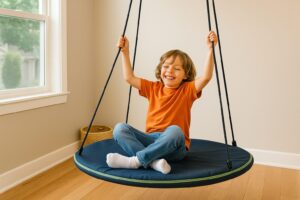Platform Swings: Benefits, Safe Setup, and Best Picks
A platform swing is a flat, stable swing (round or square) that kids can sit, kneel, or lie on. It’s a favorite OT tool for building balance and core strength while delivering calming vestibular input. Below you’ll find benefits, safe installation tips, activity ideas, and our best picks.
- Great for balance, coordination, and core strength
- Common styles: square or round, padded or mesh
- Mounting: ceiling joist hardware, doorway bar, or free-standing frame
- Pairs well with crash pads, weighted lap pads, and a visual schedule
What is a platform swing?
Unlike a cocoon or pod swing, a platform swing offers an open, flat surface so children can change positions—sitting, kneeling, tummy-lying, or side-lying. This versatility makes it ideal for therapy tasks and imaginative play while supporting vestibular & movement needs.
Benefits of platform swings
- Vestibular regulation: slow, rhythmic swinging can calm the nervous system; short, targeted bursts can increase alertness.
- Core & postural strength: holding different positions strengthens trunk and shoulder stability.
- Balance & coordination: practice righting reactions and body awareness in space.
- Flexible play: combine with crash pads, bean bags, or balls for multi-sensory games.
- Inclusive design: works across ages/abilities with proper supervision and setup.
Types of platform swings
- Square platforms: stable corners; great for kneeling and tummy-time activities.
- Round platforms: roomy disc; comfortable for lounging, reading, or partner play.
- Padded/therapeutic platforms: extra cushioning for longer sessions and low-noise settings.
- Mesh/outdoor platforms: breathable fabric; easy to clean for outdoor setups.
How to safely install a platform swing
- Ceiling mount: find a load-bearing joist and use rated hardware (swivel + carabiners). Check capacity and inspect regularly.
- Doorway bar: renter-friendly when rated for dynamic loads; follow manufacturer limits.
- Free-standing frame: portable option for rooms where ceiling mounting isn’t possible.
- Safety zone: add a crash pad/rug and keep a clear 6–8 ft swing path.
Need step-by-step help? See the Sensory Swing Mounting Guide.
OT-inspired activities to try
- Tummy-time “mail delivery”: belly-lying reaches to place beanbags into targets—great for shoulder stability.
- Balance pathway: kneel or sit criss-cross while catching/rolling a ball with a partner.
- Calm & read: slow, linear swings during story time; pair with a visual schedule for transitions.
- Heavy work pairings: swing → wall push-ups → swing to combine vestibular + proprioceptive input.
Pros
- Very versatile positions and activities
- Great for balance, coordination, and core strength
- Works for calm play or active therapy tasks
Cons
- Needs more floor clearance than pod/compression
- Heavier frames may cost more to ship/install
- Open design can feel less secure for enclosure-seeking users
Best Platform Swings (Editor Picks)
Click to view details and current price on Amazon. (These links are affiliate links.)
Sorbus 24″ Round Platform Swing
My quick take: Compact 24″ disc with a comfy foam edge. Great single-rider platform for small spaces or a starter setup.
- Brand: Sorbus
- Materials: Heavy-duty PP (polyethylene) mat seat; alloy steel outer frame with NBR foam
- Dimensions: 24″ D × 24″ W × 63″ H
- Max weight: 220 lb
- Max tilt: 45°
- Includes: swing, mounting accessories, instructions (adult assembly & supervision; recommended 5+)
- Use: Indoor/Outdoor
TURFEE 900D Platform Swing (900 lb)
My quick take: Heavy-duty build that can take real use. The 900D waterproof seat and 900 lb rating make it a solid choice for shared play.
- Brand: TURFEE
- Materials: 900D Oxford fabric seat; alloy steel frame
- Max weight: 900 lb
- Includes: tree swing straps, main wrench, 2 carabiners, 2 additional straps
- Ropes: adjustable
- Use: Outdoor/Indoor
Large Outdoor Platform Tree Swing (700 lb)
My quick take: Big, backyard-ready platform that fits a small group. The 900D fabric + steel frame combo feels solid, and the 700 lb rating gives plenty of headroom.
- Materials: 900D fabric seat; alloy steel frame
- Max weight: 700 lb
- Capacity: up to 5 kids or two adults
- Includes: step-by-step picture instructions, complete hardware & mounting gear
- Install: attaches to trees in minutes
- Use: Outdoor
Affiliate notice: As an Amazon Associate, we earn from qualifying purchases.
Platform Swing — Frequently Asked Questions
How much space do I need for a platform swing?
Plan for the swing’s full arc plus a buffer of 2–3 ft on all sides. Many families like an open area of roughly 6–8 ft in the primary swing direction. Add a mat or rug under the path.
What ceiling height works best?
7–9 ft ceilings are typical. Use adjustable daisy chains/straps to set a safe seat height (feet can touch the floor to stop).
Single-point vs. multi-point (two ropes) — which is better?
Single-point gives smooth linear motion and optional gentle rotation (with a rated swivel). Multi-point reduces spin and can feel more stable for balance/core work.
Can I install a platform swing without drilling?
Yes. Use a free-standing frame or doorway bar rated for dynamic load. If drilling into joists, follow our Mounting Guide.
What weight capacity should I look for?
Check the manufacturer’s working load (everyday safe limit). Our picks range from 220–900 lb. Choose hardware that comfortably exceeds user(s) + swing + dynamic forces.
Is spinning safe on a platform swing?
Keep movement slow and predictable unless a clinician recommends otherwise. If motion sensitivity is an issue, avoid long or fast spins and favor linear front-to-back motion.
Indoor vs. outdoor use?
Many platforms can be used outdoors if the seat fabric and ropes are weather-appropriate. Store fabric out of sun/rain to extend life and inspect hardware regularly.
Any OT-style activities to try?
Tummy-time mail delivery (beanbag targets) for shoulder stability, balance catch/roll while kneeling, and calm-and-read with slow linear swinging. Pair with a visual schedule for transitions.
What safety rules should we use?
Keep it simple: One rider (unless rated), feet first, slow and steady, ask to start/stop. Supervise at all times and check hardware/fabric weekly.

